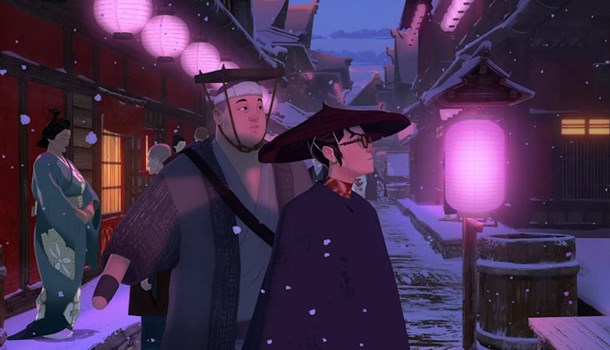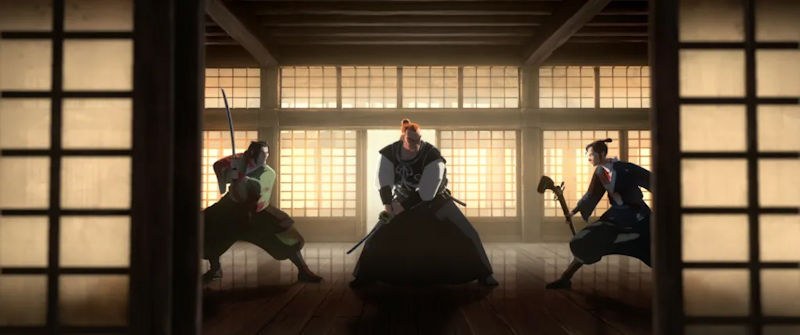
Written by Ross Locksley on 04 Jan 2024
Distributor Netflix • Certificate NA • Price NA
Once again we're stretching the definition of anime with Netflix, with Blue Eye Samurai set in Japan but produced by French studio Blue Spirit and written by American Michael Green (Logan, Blade Runner 2042) and his partner Amber Noizumi. According to an interview with The Hollywood Reporter, the idea for the show was first crystalised with the birth of their child who had blue eyes - Noizumi was fascinated by how happy she was with her daughter's blue eyes and mixed heritage.
Given that the show is set in Japan and covers many cultural nuances with a deft hand, we're covering it here, even if it isn't created by a Japanese team. Game recognise game. Maybe we need a new term - Animetflix? NetAnime? Answers on a postcard...
So accepting that this is animation set in Japan, let's dive in. The series follows Mizu, an "abomination" mixed race child with blue eyes who is subject to the prejudice of Edo-period Japan. Driven from home and seeking revenge on the white men that sired this outcast, Mizu eventually finds a home with a blind swordsmith and trains until the titular Samurai is ready to undertake the bloody quest.
And let's start by saying this is a series that's absolutely dripping with quality. The direction by Jane Wu is stunning, every frame carrying dramatic weight, each motion a study in grace and style. Any single captured frame looks like a work of art, and what's more it all works in service of a story that follows the hero's journey but still manages to create genuine tension and surprise. No one character is safe, Mizu isn't unbeatable and the antagonists aren't entirely unsympathetic. It's a heady mix of action, adventure and bloody revenge!
All of this is enhanced by a stellar voice cast - Ming-Na Wen, Masi Oka, Maya Erskine, Brenda Song and George Takei. The real show-stealers are the villainous pairing of Randall Park, who plays the treacherous Heiji Shindo, and Kenneth Brannagh, as Irish villain Abijah Fowler, so softly spoken and threatening that he just steals every scene he's in. That his own personal history is so tragic and disturbing makes him almost an anti-hero within the show, even though the atrocities he's wrought are truly disturbing. I can absolutely see why Brannagh would be interested in this role. All in, it's a genuine top shelf ensemble and speaks volumes for the allure of the project.
They're all well-served by the plot too, with the supporting cast all having their own well-developed and surprising arcs, Mizu's quest being more of a common thread than a focus around which everyone else is in thrall to. Taigen and Akemi's relationship is its own story, with Akemi's journey from lovesick Disney Princess to cold-hearted social climber being particularly brutal.

Art direction is truly stunning
What I particularly liked about the series was the pragmatic focus of Mizu. Never a "Mary Sue", the character is fallible and even outright cruel at times, in both the treatment of those who would join the quest, and bystanders who are suffering the cruelty of others. There is nothing but the quest and no distraction that will be countenanced. Battles are fought and lost more than they are won. The reasoning behind Mizu's dim worldview is revealed as the show unravels its many mysteries, and to spoil them here would be a huge disservice, so know only that Mizu is not heroic in the traditional sense, but is sympathetic and more well-rounded than any character I encountered in 2023.
While trying to avoid spoilers, I have to talk about the framing of some episodes, which is utterly masterful. Every one of the eight episodes is excellently put together, but episode 5, The Tale of the Ronin and the Bride, uses a fairytale puppet performance to frame the story of Mizu's past - the location of the show and the audience is a complete surprise and a wonderful piece of direction.
The show raises a number of particularly interesting parallels to the modern day too. The Edo Period was a time of great introspection in Japan, with outsiders completely banned from the country. I found it interesting that the idea of Western culture being rejected might have been a swipe at Western colonisation, but it equally shows how immigration of any kind could be dangerous - Fowler himself opines that from a small "crack" will come a wave of invaders intent on burning the country's culture to the ground, selling violence and vice until the country chokes on it. Having seen so many pictures over the last few years of hundreds of thousands crossing borders bringing drugs and violence with them in both the US and Europe, I do wonder if the show is less a criticism of Western values and more an anti-immigration piece. Either side could use Blue Eye Samurai for their respective arguments, and this duality of purpose and morals makes the show all the more fascinating and grounded.
Rarely do I watch a show with so much going for it. I've loved watching anime for over 30 years and seeing how stories from other cultures can speak to us universally, but to see a US/French co-production of such quality makes it clear that the medium has very much raised the bar for animation globally. This is a truly worthy animation that stands proudly alongside anime revenge tales like Samurai Champloo, Berserk and Cowboy Bebop as an absolute classic. Blue Eye Samurai is a true credit to all involved.

Ross founded the UK Anime Network waaay back in 1995 and works in and around the anime world in his spare time. You can read his more personal articles on UKA's sister site, The Anime Independent.
by Richard Durrance on 20 Feb 2026
by Ross Locksley on 19 Feb 2026
by Ross Locksley on 08 Feb 2026
by Ross Locksley on 25 Jan 2026
by Ross Locksley on 01 Jan 2026
by Ross Locksley on 21 Dec 2025
by Ross Locksley on 25 Nov 2025
by Ross Locksley on 24 Nov 2025